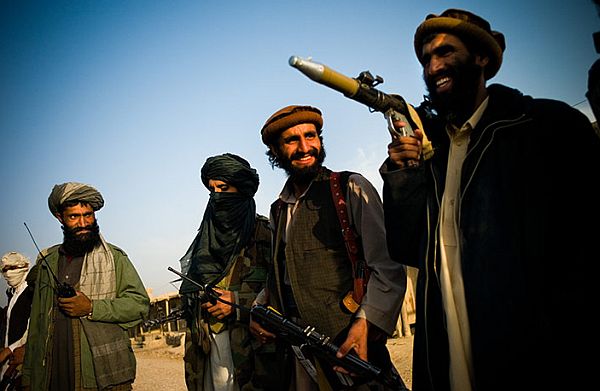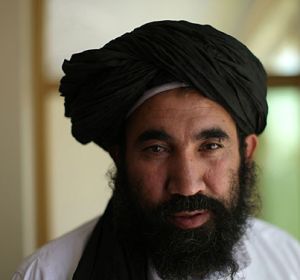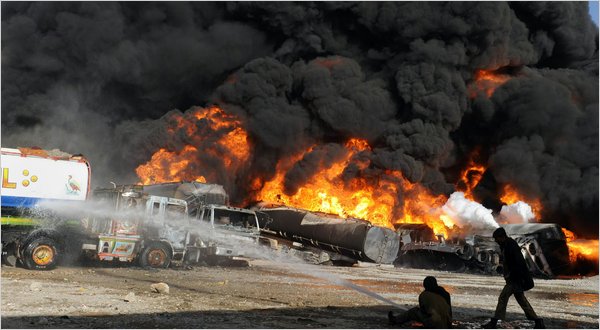Sunni monarchies close ranks
Reports that the Gulf Cooperation Council (GCC) is considering some form of membership for two non-Gulf states – Jordan and Morocco – confirm that the conservative Sunni monarchies of the Middle East are closing ranks against Iran, Shiite-led Iraq and the democratic wave sweeping the region.
GCC secretary general Abdullatif al-Zayani made the announcement Tuesday after a summit of the six-member group affirmed support for Saudi and United Arab Emirates military intervention against predominantly Shiite pro-democracy protesters in Bahrain.
Zayani did not make clear whether Morocco and Jordan would be offered a second-tier membership in the GCC, which groups Saudi Arabia, Kuwait, Oman, the UAE, Qatar and Bahrain.
Foreign ministers from Jordan and Morocco will meet with GCC foreign ministers to “complete required procedures”, Zayani told reporters.
Founded in 1981 in the aftermath of Iran’s 1979 revolution and in the midst of the 1980-88 Iran-Iraq war, the GCC encourages economic and especially military cooperation among its members, which all border the Persian Gulf. In territorial terms, it would make more sense to offer membership to Iraq or Yemen than to Jordan or faraway Morocco.
However, the wave of popular unrest that has swept the region since January – and toppled once durable pro-Western authoritarian non- monarchies in Tunisia and Egypt – has spread anxiety among conservative Sunni monarchies already unsettled by the Shiite replacement of a Sunni regime in Iraq and by Iran’s slow but steady nuclear advancement. (IPS)
Syria shells major city as crackdown spreads
The Syrian military intensified a methodical, ferocious march across the country’s most restive locales on Wednesday, shelling the country’s third-largest city from tanks, forcing hundreds to flee and detaining hundreds more in what has emerged as one of the most brutal waves of repression since the Arab Spring began.
Homs, in central Syria near the Lebanese border, has become the latest target of the crackdown, which has already besieged and silenced, for now, the cities of Dara’a, in the fertile but drought-stricken southern steppe, and Baniyas, on the Mediterranean coast. Dozens of tanks occupied Homs, as black-clad security forces, soldiers and militiamen in plain clothes filtered through the industrial city of 1.5 million people. At least 19 people were killed there Wednesday, human rights groups said.
The crackdown in some neighborhoods alternated with the relative calm in the center of a city that is home to a Sunni Muslim majority and a Christian minority.
“We see the smoke rising in the sky after we hear the shells explode,” said Abu Haydar, a resident reached by telephone. “The sky was pretty quickly covered in smoke.”
In public statements and interviews, the government has acknowledged the crackdown, describing the military’s targets as militant Islamists and saboteurs. It said nearly 100 soldiers and members of the security forces had been killed, and American officials say that some protesters have indeed taken up arms.
In Washington, two Obama administration officials said that the United States still did not see a clear or organized opposition or another leader in Syria who could serve to unite the foes of the government of President Bashar al-Assad. (New York Times)
What will a post-Assad Syria look like?
Joshua Landis writes: I am a pessimist about Syria’s future because the regime will dig in its heels and fight to the end. The Syrian opposition has successfully established a culture of resistance that is widespread in Syria and will not be eliminated. Even if demonstrations can be shut down for the time being, the opposition will not be defeated. Syria’s youth, long apolitical and appathetic, is now politicized, mobilized, and passionate. All the same, the opposition remains divided and leaderless, which presents great dangers for a post-Assad Syria.
It is hard to see any soft landing for the regime or the people. It is also hard to see how the regime will be brought down short of economic collapse and its inability to pay wages, which would lead to wider social defections and a possible splitting of the military, as happened in Lebanon and Libya. If the military splits, both sides would have ample firepower to do real damage. Large sections of Syria could fall out of state control. Regions not divided by sect could remain fairly quite and stable for a time if there is a unified political leadership to step into the vacuum. Otherwise competing parties will develop militias as happened in Iraq and Lebanon.
No foreign power will feel compelled to step in to protect the people or stop the fighting because no one will be responsible for “losing Syria.” Syria is a political orphan today.
The army has split in Syria once before. This happened in Feb 1954 at the end of Adib Shishakli’s rule. The army divided along geographic lines. The divisions in the North went with the opposition centered on the People’s Party based in Homs and Aleppo. The South stood by Shishakli. Fortunately, General Shishakli decided to leave the country and flew off to Saudi Arabia, helped by the US. He had a change of mind in mid air but the US prevented his return. Washington convinced Lebanon to refuse his jet landing rights. After a brief spell in Arabia, Shishakli migrated to Brazil, where a relative of a Druze man, for whose death Shishakli was responsible, assassinated him.
Syria’s great weakness is it lack of unity. This is why the Assad household has been able to rule for so long. Hafiz al-Assad was able to bring stability to Syria after 20 years of coups and political chaos by reverting to the use of traditional loyalties. He ended Syria’s period as a banana republic by placing his brother in charge of protecting the presidency and using tribal and sectarian loyalties to coup-proof the regime. Alawite faithful were carefully recruited to all the sensitive security positions in the Mukhabarat and military. The Sunni elite was grateful for the stability and was further brought in through the crafty use of graft and patronage. Rami Makhlouf is corrupt, but he is also the fixer for the Sunni merchant class. The way he brought the Sham Holding Company in to the circle of regime loyalists was a classic use of privilege and muscle to glue the elite families of Syria to the regime. They have made millions my accepting an offer that they could not refuse.
The Syrian opposition has always been divided between Arab nationalists, Islamist currents, liberals, and all those who disprove of the regime but are too conservative to take part in active opposition. Then there are the sectarian communities and the Kurds, class divisions, and the urban-rural split, not to mention the traditional rivalry between Damascus and Aleppo. The reason that the Assads have been so successful for so long is largely due to the inability of Syrians to unite around a common platform and national identity. The oppositions lack of unity does not augur well for a post Assad future, especially as the death toll mounts and the desire for revenge grows. (Syria Comment)
Yemeni forces kill 18 and wound hundreds as unrest escalates
Yemeni forces have opened fire on demonstrators in three major cities, killing at least 18 and wounding hundreds in one of the fiercest bouts of violence witnessed in nearly three months of popular unrest aimed at toppling President Ali Abdullah Saleh.
The clashes between a defected faction of Yemen’s army and the republican guard, have raised fears that Yemen may be reaching a critical juncture as public fury continues to mount at the president’s refusal to step down.
Violence broke out in the capital when a throng of 2,000 protesters tore away from the main sit-in area at Sana’a University and surged en masse towards the cabinet building in downtown Sana’a with shouts of “God is great” and “Allah rid us of this tyrant”. (The Guardian)
Turkey’s Erdogan: Hamas is a political party, not a terrorist group
Hamas is not a terror organization, Turkish Prime Minister Recep Tayyip Erdogan said in an interview with U.S. television late Wednesday, saying he felt the recently penned Palestinian reconciliation agreement was an essential step toward Mideast peace.
Erdogan’s comments came one day after Hamas Gaza strongman Mahmoud Zahar said that while his organization would accept a Palestinian state within 1967 borders, it would never recognize Israel, as a result of the damage such a move would do to Palestinian refugees in the “diaspora.”
Senior Israeli officials, led by Prime Minister Benjamin Netanyahu, have voiced opposition to Fatah’s new unity deal with Hamas, saying that a Palestinian government that included a terrorist group calling for Israel’s destruction could not be a partner for peace.
Speaking to Charlie Rose on Wednesday, however, the Turkish PM chimed in on the recently achieved unity agreement between rival Palestinian factions Fatah and Hamas, indicating that he did not feel Hamas was an obstacle in achieving Mideast peace. (Haaretz)
Abbas determined to retain Fayyad as PM of Fatah-Hamas cabinet, report says
Palestinian President Mahmoud Abbas has told Egyptian officials that incumbent Prime Minister Salam Fayyad is his only candidate to head the burgeoning Palestinian unity cabinet, the London-based Arabic daily Al-Hayat reported on Thursday.
The report came after international donors were reportedly applying significant pressure on Abbas to retain Fayyad as prime minister, after earlier reports claimed the Palestinian prime minister would have to step down as a result of Fatah’s newly signed unity pact with former rivals Hamas. (Haaretz)
Nato air strikes hit Gaddafi compound in Tripoli again
Muammar Gaddafi’s compound in Tripoli has been hit by Nato rockets again, a few hours after the veteran autocrat appeared in public for the first time in almost two weeks.
Gaddafi was shown on state television in a traditional brown robe addressing tribal leaders, whom he empowered to speak on behalf of a nation he has ruled with absolute power for almost 42 years.
The labyrinthine complex in the heart of the capital was struck at around 3am with five bombs and rockets that appeared to target military installations and bunkers.
A giant crater could be seen in the lawn in the middle of the complex, with one of the rockets having hit what appeared to be a bunker . Officials said six people were killed in the attack, including two Libyan reporters who had been interviewing supporters camped out at the scene.
“These locations were known to be command and control facilities engaged in co-ordinating attacks against civilian populations in Libya,” said a Nato official speaking from Brussels.
Libyan spokesman Moussa Ibrahim said the underground facility was not a bunker, but a sewage network. But following the strike, chanting Gaddafi supporters guarded a stairwell leading to the ruined site, having been told to let no reporters near it. Heat rose from a second smaller crater, where shattered reinforced concrete exposed a cavernous hole beneath. (The Guardian)
Libyan opposition invited to White House Friday
The Obama administration is stepping up its engagement with forces fighting Libyan leader Muammar Gaddafi, inviting opposition leaders to meet with U.S. officials at the White House Friday, while stopping short of recognizing their council as Libya’s legitimate government.
The White House said Mahmoud Jibril, a representative of the Libyan Transitional National Council, would meet with senior administration officials, including National Security Adviser Tom Donilon, as well as members of Congress. But there were no plans for President Barack Obama to meet with Jibril and his delegation.
France and Italy are among the nations that recognize the Council as Libya’s legitimate government. But White House press secretary Jay Carney said today that while the U.S. would continue consulting and assisting the opposition, giving the Council political legitimacy would be “premature.”
Defence Secretary Robert Gates, speaking with Marines, said the U.S. is keeping a “wary eye” on the opposition, and lacks clarity about exactly who the opposition is and what actions they may take long-term.
Still, the U.S. has been boosting its support for the opposition over the past month, including Obama’s authorization of $25 million in non-lethal assistance to the revolutionaries. The first shipment of that aid — 10,000 meals ready to eat from Pentagon stocks — arrived in the liberated city of Benghazi this week. The U.S. has also supplied some $53 million in humanitarian aid.
In addition, the administration has begun working with Congress to free up a portion of the more than $30 billion in frozen Gaddafi regime assets in U.S. banks so it can be spent to help the Libyan people. Senator John Kerry, a Democrat, who met with Jibril this week, said yesterday he was drafting legislation at the request of the White House that would allow that to happen.
The revolutionaries have said they need up to $3 billion in the coming months for military salaries, food, medicine and other supplies in order to keep fighting Gaddafi’s forces. They also say no country has sent the arms that they desperately need. (Libya TV)
Move to expand the war on terrorism
Less than two weeks after U.S. special operations commandos killed Osama bin Laden, a resolution viewed as an expansion of the legal basis for the global war on terror is moving through Congress.
The House Armed Services Committee added language to the fiscal 2012 Defense Authorization bill on Wednesday that would define the current war on al Qaeda to include the Taliban and affiliated armed groups, affirming the U.S. District Court for the District of Columbia’s interpretation of the 2001 war resolution.
The committee began marking up the bill on Wednesday. It sets out the guidance for the U.S. defense budget.
The provision, known as the Authorization for the Use of Military Force, is key legislation used by lawyers for both President George W. Bush and President Obama as a legal basis for detaining terrorists without trial who are captured around the world. The legislation also was used to authorize U.S. drone strikes and special operations forces raids in countries where the United States is not formally at war.
Civil liberties groups have expressed worries that the new legislation, sponsored by Rep. Howard P. “Buck” McKeon, California Republican and committee chairman, significantly expands the scope of the global war on terror. (Washington Times)
Taliban join the Twitter revolution
When the Taliban ruled Afghanistan, they eschewed most modern technology, including television and music players.
But in the latest sign of the hardline movement’s rapprochement with at least some areas of the modern world, the Taliban have embraced microblogging.
Their Twitter feed, @alemarahweb, pumps out several messages each day, keeping 224 followers up to date with often highly exaggerated reports of strikes against the “infidel forces” and the “Karzai puppet regime”.
Most messages by the increasingly media-savvy movement are in Pashtu, with links to news stories on the elaborate and multilingual website of the Islamic Emirate of Afghanistan, as the Taliban’s shadow government likes to style itself. (The Guardian)


 Zaeef is now a prolific writer and speaks five languages fluently. According to many Taliban insiders, if there are any negotiations between the Taliban and the Americans they will go through him.
Zaeef is now a prolific writer and speaks five languages fluently. According to many Taliban insiders, if there are any negotiations between the Taliban and the Americans they will go through him.

